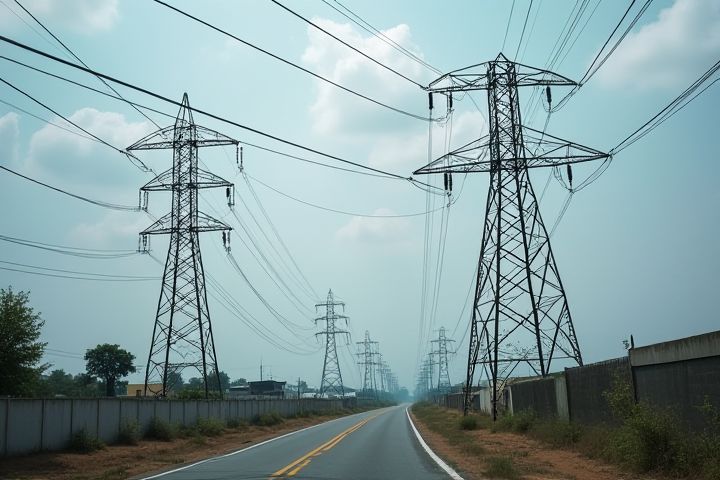
Electricity supply in Nigeria faces significant challenges, with only about 60% of the population having access to reliable power. The country generates most of its energy from natural gas, alongside hydroelectric sources, but frequent outages and inadequate infrastructure hinder consistent distribution. The government has initiated several reforms aimed at privatizing the power sector to attract investment and improve efficiency. In urban areas, the prevalence of generator usage reflects the unreliability of grid power, while rural communities often rely on off-grid solutions such as solar panels. With ongoing efforts to expand renewable energy sources, there is potential for increased access to clean electricity for millions of Nigerians.
National Grid Issues
Nigeria's electricity supply predominantly hinges on the challenges of its National Grid, which is plagued by infrastructure inadequacies and frequent system failures. The grid, comprising various generation, transmission, and distribution systems, often struggles to meet the surging energy demands of a growing population. Inadequate investment in renewable energy sources has limited the diversification of supply, leaving many regions reliant on inconsistent power from the national network. Addressing these National Grid issues is essential for achieving energy stability and promoting socioeconomic development across the country.
Private Sector Involvement
The electricity supply in Nigeria is increasingly relying on private sector involvement to enhance efficiency and reliability. Various independent power producers (IPPs) are entering the market, contributing to the generation capacity and addressing the nation's power shortages. Government initiatives, such as the National Electricity Regulatory Commission (NERC), aim to create a more competitive environment, attracting foreign investment and fostering innovation. As a result, you can expect improvements in infrastructure and service delivery, ultimately benefiting consumers across the country.
Infrastructure Deficiencies
Infrastructure deficiencies significantly hinder electricity supply in Nigeria, impacting both urban and rural areas. Over 40% of the population lacks access to reliable power, resulting in economic setbacks and affecting education and healthcare services. The inadequacy of transmission lines, outdated generation facilities, and insufficient substations contribute to frequent outages and diminished service quality. Investing in upgrades and maintenance of this critical infrastructure is essential for achieving sustainable energy access and supporting national development goals.
Power Generation Capacity
Nigeria's electricity supply is heavily influenced by its power generation capacity, which is primarily derived from natural gas, hydropower, and renewable energy sources. The country has made significant investments in infrastructure to enhance its energy output, aiming to meet the growing demand from industrial and residential sectors. With an installed capacity of over 13,000 megawatts, Nigeria faces challenges in actual power generation due to transmission losses and inadequate distribution networks. As electricity access continues to expand, innovations in off-grid solutions and renewable energy are crucial for ensuring a sustainable and reliable energy future for all Nigerians.
Frequent Load Shedding
Electricity supply in Nigeria is heavily affected by frequent load shedding, a practice implemented to manage limited energy resources. This intermittent power distribution results from a combination of aging infrastructure, inadequate generation capacity, and rising demand from a growing population. Load shedding disrupts everyday life, impacting businesses, education, and healthcare facilities, leading to economic losses and decreased quality of life. By investing in renewable energy sources and modernizing the grid infrastructure, Nigeria can aim to stabilize its electricity supply and reduce the frequency of load shedding.
Alternative Energy Sources
Nigeria's electricity supply increasingly emphasizes alternative energy sources to address the challenges of unreliable power and limited access. Solar energy, with its abundant sunshine, presents a viable solution for rural and urban electrification, enabling decentralized power systems. Wind energy, alongside biomass and hydropower, diversifies the energy mix and promotes sustainability, reducing reliance on fossil fuels. By investing in these renewable technologies, Nigeria not only aims to enhance its energy security but also strives to achieve long-term environmental benefits.
High Energy Demand
Electricity supply in Nigeria is primarily driven by the nation's high energy demand, fueled by a rapidly growing population and expanding urban centers. Power generation relies heavily on fossil fuels, particularly natural gas, which constitutes a significant portion of the energy mix. As a result, the country faces persistent challenges of infrastructure inadequacy and frequent power outages, impacting businesses and households alike. To address these issues, initiatives aimed at diversifying energy sources, including renewable energy projects, are gaining traction in the quest for a reliable and sustainable electricity supply.
Government Initiatives
The electricity supply in Nigeria relies heavily on government initiatives aimed at improving infrastructure and access to energy. The Nigerian government has launched programs such as the Power Sector Reform Act and the National Renewable Energy and Energy Efficiency Policy, which promote investment in renewable energy sources and enhance grid stability. Furthermore, initiatives like the Nigerian Electricity Regulatory Commission (NERC) play a crucial role in regulating the electricity market, ensuring fair competition and consumer protection. Your engagement with these developments can foster a deeper understanding of how public policy shapes the country's energy landscape.
Tariff Structures
Nigeria's electricity supply is significantly influenced by its tariff structures, which play a crucial role in regulating the pricing of electricity for consumers. Tariffs are designed to encourage investment in generation capacity while addressing the challenges of an unreliable power distribution network. The Nigerian Electricity Regulatory Commission (NERC) periodically reviews these tariffs to reflect operational costs and promote efficiency among utility providers. Understanding your electricity tariff can empower you to make informed decisions regarding energy consumption and management.
Rural Electrification Challenges
Rural electrification in Nigeria faces significant challenges, primarily due to inadequate infrastructure and funding. Many rural areas are underserved, leading to limited access to reliable electricity, which hampers economic development and social services. The high cost of extending the power grid, coupled with frequent power outages, exacerbates energy poverty among rural communities. Innovative solutions, such as solar microgrids and off-grid renewable energy systems, offer viable alternatives to enhance electricity access and improve the quality of life for your rural residents.
